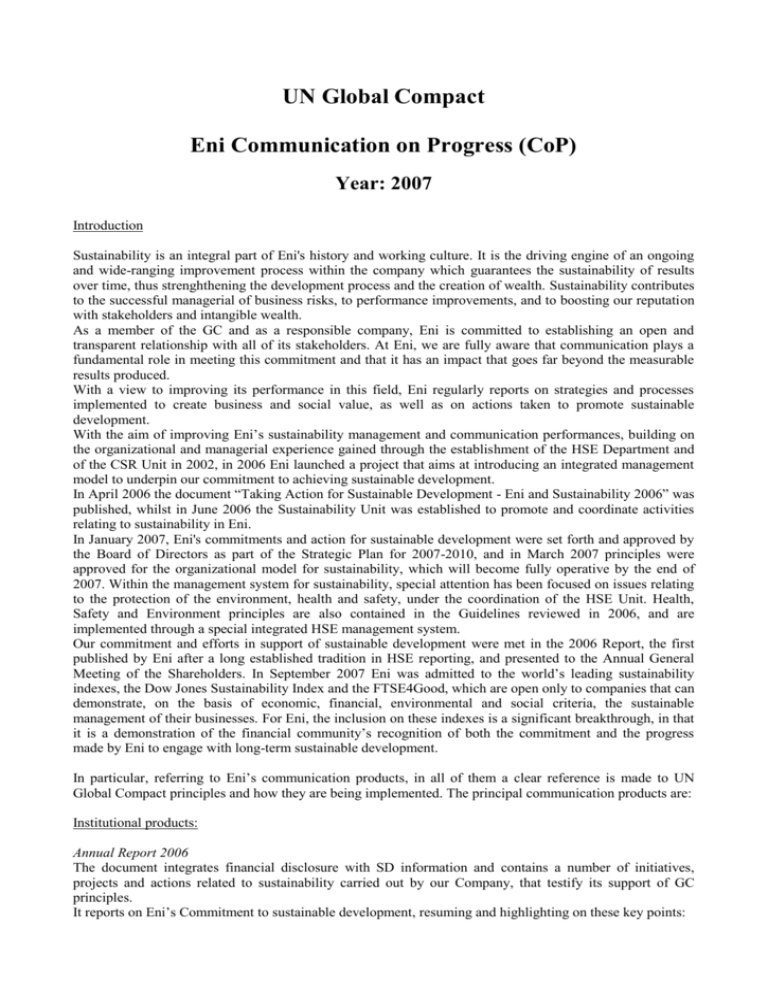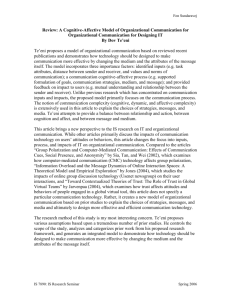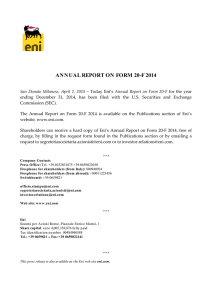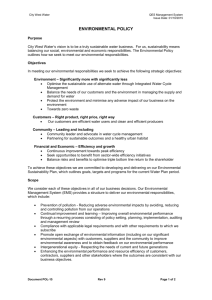COP - United Nations Global Compact
advertisement

UN Global Compact Eni Communication on Progress (CoP) Year: 2007 Introduction Sustainability is an integral part of Eni's history and working culture. It is the driving engine of an ongoing and wide-ranging improvement process within the company which guarantees the sustainability of results over time, thus strenghthening the development process and the creation of wealth. Sustainability contributes to the successful managerial of business risks, to performance improvements, and to boosting our reputation with stakeholders and intangible wealth. As a member of the GC and as a responsible company, Eni is committed to establishing an open and transparent relationship with all of its stakeholders. At Eni, we are fully aware that communication plays a fundamental role in meeting this commitment and that it has an impact that goes far beyond the measurable results produced. With a view to improving its performance in this field, Eni regularly reports on strategies and processes implemented to create business and social value, as well as on actions taken to promote sustainable development. With the aim of improving Eni’s sustainability management and communication performances, building on the organizational and managerial experience gained through the establishment of the HSE Department and of the CSR Unit in 2002, in 2006 Eni launched a project that aims at introducing an integrated management model to underpin our commitment to achieving sustainable development. In April 2006 the document “Taking Action for Sustainable Development - Eni and Sustainability 2006” was published, whilst in June 2006 the Sustainability Unit was established to promote and coordinate activities relating to sustainability in Eni. In January 2007, Eni's commitments and action for sustainable development were set forth and approved by the Board of Directors as part of the Strategic Plan for 2007-2010, and in March 2007 principles were approved for the organizational model for sustainability, which will become fully operative by the end of 2007. Within the management system for sustainability, special attention has been focused on issues relating to the protection of the environment, health and safety, under the coordination of the HSE Unit. Health, Safety and Environment principles are also contained in the Guidelines reviewed in 2006, and are implemented through a special integrated HSE management system. Our commitment and efforts in support of sustainable development were met in the 2006 Report, the first published by Eni after a long established tradition in HSE reporting, and presented to the Annual General Meeting of the Shareholders. In September 2007 Eni was admitted to the world’s leading sustainability indexes, the Dow Jones Sustainability Index and the FTSE4Good, which are open only to companies that can demonstrate, on the basis of economic, financial, environmental and social criteria, the sustainable management of their businesses. For Eni, the inclusion on these indexes is a significant breakthrough, in that it is a demonstration of the financial community’s recognition of both the commitment and the progress made by Eni to engage with long-term sustainable development. In particular, referring to Eni’s communication products, in all of them a clear reference is made to UN Global Compact principles and how they are being implemented. The principal communication products are: Institutional products: Annual Report 2006 The document integrates financial disclosure with SD information and contains a number of initiatives, projects and actions related to sustainability carried out by our Company, that testify its support of GC principles. It reports on Eni’s Commitment to sustainable development, resuming and highlighting on these key points: Eni’s commitment to promoting the sustainability of its results in time and to widening its relations with its stakeholders, improving corporate performance and increasing the value of intangible assets; the central role the Board of Directors in i) defining sustainability policies, ii) discussing and approving the strategic guidelines of its 2007-2010 Strategic Plan where it identified the main challenges and commitments in the area of sustainability in the next years, and iii) approving the Sustainability Report submitted also to the Shareholders’ Meeting; Eni’s commitment to the UN Global Compact since 2001, especially in the field of human rights, corruption fight and environmental protection; Eni’s challenges and commitments to governance and stakeholder engagement, people, environmental responsibility, innovation and communities. Eni’s website (www.eni.it) Sustainability also receives extensive coverage in Eni’s website by a reorganization of the section dedicated to the matter. The main Sustainability webpage contains various links to all sustainability issues, focusing on: the interactive version of Eni’s 2006 Sustainability Report; Challenges, Commitments and Actions; interactive charts and main sustainability projects undertaken, testifying Eni’s involvement in the promotion of sustainable development. A large number of documents and publications with respect to sustainability can also be selected and downloaded from the web site. Publications dedicated to Sustainability: Taking Action for Sustainable Development; Eni and Sustainability 2006 The paper represents the first result of the Sustainability Project launched by Eni in February 2006, which aims at further improving its performance on this issue and at better integrating sustainability objectives into its business model. In particular, the publication reports on challenges, commitments, actions and results with respect to a number of key aspects of sustainable development: governance, labor standards, environment, technological innovation, relations with the territory and the communities, with a focus on the stakeholder engagement process and a reference to Social Impact Assessment (SIA), as an instrument to manage social and territorial critical issues deriving from activities. Examples of social implication of some projects are included (i.e. Goliath Project in Norway; Karachaganak in Kazakhstan) Sustainability Report 2006 The document is the main output of the sustainability project launched in 2006. This is the first complete report on sustainability published by Eni and it reflects the sustainability principles and challenges to which Eni refers, the progress achieved in relation to these issues and the future sustainability strategies and objectives that Eni intends to pursue. The Sustainability Report, drawn up on a yearly basis and almost always containing information and data referred to the consolidation areas within the Eni Consolidated Data Reporting system, is based on the Sustainability reporting process. Eni’s sustainability reporting methodology is the result of a reasoned analysis of relevant sustainability topics, backed by a process of sharing and comparison (which lasted approximately 15 months) that had a cross-sectional involvement of Eni’s facilities and resorted to the contribution of the Eni Enrico Mattei Foundation. Stakeholder engagement has been a key factor in defining the areas to evaluate for the reporting system and for sustainability communications. Many functions within the company have been involved in the process of identifying and collecting data and information. During the planning phase, a questionnaire was sent to some external organizations representing the main categories of Eni’s stakeholders to gauge expectations and assessments of Eni’s levels and contents in sustainability communications. A quality survey on the company’s internal and external stakeholders’ opinions was also conducted by Eurisko (an Italian research institute) on the draft version of the 2006 Sustainability Report. The feedback obtained has been used to improve the document itself and it will be used in the future as a guideline to choose which information and indicators should be used in the reporting system to be communicated externally. The postulates for preparing the report, which have also influenced the methodology of the reporting system are: the temporal comparability, the quick and balanced vision of Eni’s Sustainability performances, the completeness, comprehensibility and reliability of the communication on all the issues related to Eni’s sustainable activities. Country Sustainability Reports (Nigeria) Eni recognises the need to provide in-depth information about some special issues and/or territorial contexts in which it operates. To achieve that, Eni intends to develop an editorial line of sustainability reports dedicated to a specific issue or country. In 2007, Eni prepared a draft of the “Eni in Nigeria: Focus on Sustainability” which has been released in hard copy to Amnesty International and Legambiente during a meeting in July 2007 exclusively dedicated on that issue. Eni’s 2007 Energy Efficiency Campaign In line with its commitment to a more rational use of resources, in May 2007 Eni launched a national Energy Efficiency Campaign featuring 24 simple suggestions to enable families to reduce their energy costs by up to 30% and save up to 1,600 euros per year. Through this important programme of education and information, Eni aimed to raising citizens’ awareness of energy saving and environmental sustainability. This campaign was intended to act as a catalyst to involve also other players in the economic, industrial and social world in a debate on energy efficiency.








